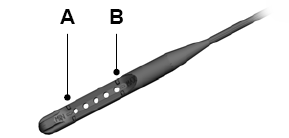Ford Escape: Exhaust System / Description and Operation - Exhaust System - Overview
Overview
NOTICE: Do not use leaded fuel in a vehicle equipped with a catalytic converter. In a vehicle that is continually misfueled, the lead in the fuel will be deposited in the catalytic converter and completely blanket the catalyst. Lead reacts with platinum to "poison" the catalyst. Continuous use of leaded fuel can destroy the catalyst and render the catalytic converter useless. The addition of lead to the catalytic converter can also solidify the catalyst, causing excessive back pressure in the exhaust system and possibly causing engine damage.
NOTICE: Extremely high temperatures of 1,100°C (2,012°F) or above due to misfiring or an over-rich fuel/air mixture will cause the ceramic substrate to sinter or burn, destroying the catalytic converter. Do not continue to operate the vehicle if the engine is misfiring, there is a power loss or other unusual operating conditions, such as engine overheating and backfiring.
NOTICE: Do not use oil or grease-based lubricants on the isolators. These lubricants may cause deterioration of the rubber. This can lead to separation of the isolator from the exhaust hanger bracket during vehicle operation.
The exhaust system provides an exit for exhaust gases and reduces engine noise by passing exhaust gases through the catalytic converters and a muffler assembly. The catalytic converters also play a major role in reducing air pollutants.
- The exhaust manifold with two catalysts connected to a flexible pipe that is mounted to the engine cylinder head.
- Exhaust passive valve - If equipped
- The muffler and tailpipe assembly.
- Isolators installed on the body and muffler hangers.
The catalytic converter plays a major role in the emission control system by operating as a gas reactor. Its function is to speed the heat-producing chemical reaction of components in the exhaust gases to reduce air pollutants.
The catalyst material inside the catalytic converter consists of a ceramic substrate.
The catalytic converter is designed to provide a long life. No maintenance is necessary.
The exhaust passive valve opens and closes mechanically based upon engine exhaust pressure and aides in the acoustic tuning of the exhaust system. If equipped, the valve requires no maintenance and is serviced as part of the muffler and tailpipe assembly.
Sound insulators and shields, attached to the underbody, protect the vehicle from exhaust system heat and should be inspected at regular intervals to make sure they are not dented or out of position. If a sound insulator and shield is damaged or shows evidence of deterioration, install a new insulator and shield. The sound insulators and shields for the muffler, muffler pipe and catalytic converter pipe are installed separately.
Some exhaust fasteners must be discarded and new ones installed as indicated in the procedures. Discard any damaged or heavily corroded fasteners and install new ones as necessary. Some exhaust fasteners are of a prevailing torque design. Use only new fasteners with the same part number as the original. Tighten the fasteners to the specified torque during reassembly to make sure of correct retention of exhaust components.
 Description and Operation - Exhaust System - Full Hybrid Electric Vehicle (FHEV) - Overview
Description and Operation - Exhaust System - Full Hybrid Electric Vehicle (FHEV) - Overview
Overview
NOTICE:
Do not use leaded fuel in a vehicle equipped with a
catalytic converter. In a vehicle that is continually misfueled, the
lead in the fuel will be deposited in the catalytic converter and
completely blanket the catalyst...
Other information:
Ford Escape 2020-2026 Service Manual: Description and Operation - Transmission Cooling - Hybrid Electric Vehicle (HEV)
Component Location Item Part Number Description 1 7R0817R081 Transmission fluid cooler tubes 2 7A0957A095 Transmission fluid cooler ..
Ford Escape 2020-2026 Service Manual: Description and Operation - Collision Warning and Collision Avoidance System - System Operation and Component Description
System Operation ACC With Pre-Collision Assist Item Description 1 ACM 2 RCM 3 CCM 4 IPC 5 BCM 6 GWM 7 ABS Module 8 IPMA Network Message Chart Network Input Messages - ACM Broadcast Message Originating Module Message Purpose ..
Categories
- Manuals Home
- 4th Generation Ford Escape Owners Manual
- 4th Generation Ford Escape Service Manual
- Child Safety Locks
- General Procedures - Brake Service Mode Activation and Deactivation
- Plug-In Hybrid Electric Vehicle Drive Modes
- New on site
- Most important about car
Engine Oil
Engine Oil Dipstick Overview


